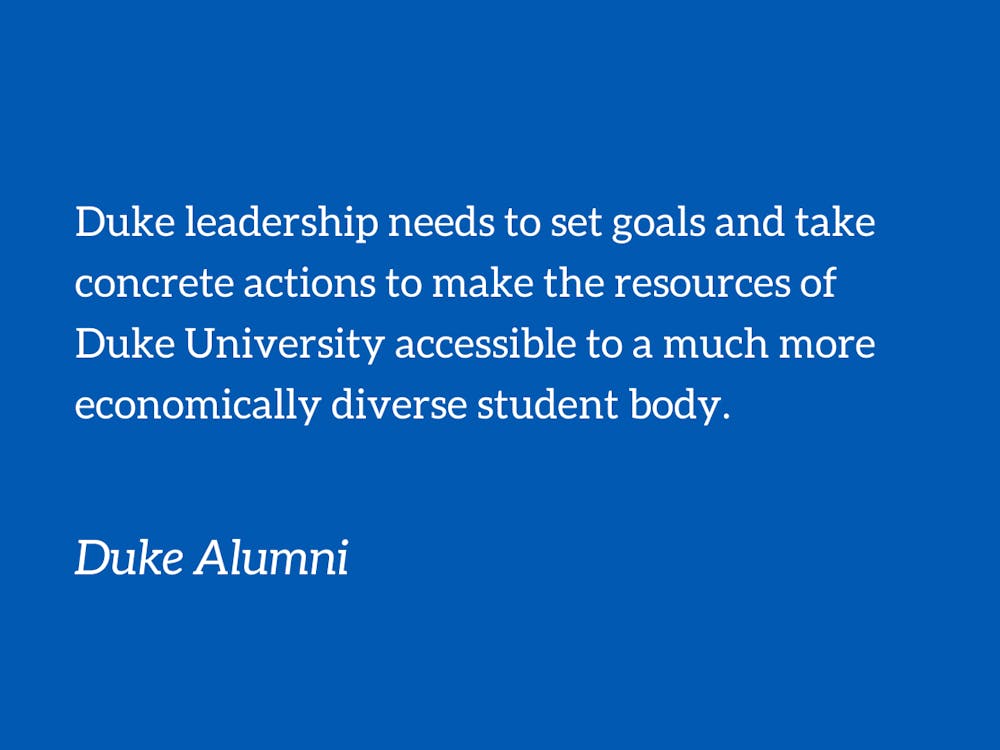In our previous recently published letter, we wrote as alumni of Duke University to urge the leadership to set goals that lead to fair and equitable employment practices, sustainable environmental policy and responsible investment strategies. We also indicated that we would address the lack of economic diversity at Duke in a separate letter. This is that letter.
Over the last few decades, America's elite, private universities have become gatekeepers and guardians of our nation's steadily widening economic divide. As an entrenched member of that group, Duke University has embraced these roles. History, culture and administrative decisions have led Duke to ignore economic diversity — as documented in a recent, well-publicized New York Times article — while fueling regional class and racial disparities.
Many are now aware of Duke's extraordinarily poor record of promoting economic diversity in its student body. Some may feel slightly encouraged by President Vincent Price's assurances that things are getting better. Many others remain deeply troubled that Duke has created a two-tiered campus outside the classroom, where access to social life and even food choices are largely dictated by family income. Without a thorough reimagining of social opportunities — free of elitist assumptions of how the world works — the school will continue to reinforce the cultural aspects of class inequality that increasingly infect and hobble American life.
Many of us are men and women who arrived on campus in the 1960s and 1970s. The values we learned in the classroom and the larger Durham community shaped our lives and led to decades of political and social activism. While we marvel at the accomplishments of the university since our time there, we believe that Duke's current direction is at odds with the best of its history and the needs of our community and nation.
The Duke of today retains an important similarity with the Duke of 1968 — a university striving for greatness while reluctant to confront at an institutional level the basic issues of its time and place. Yet just as in 1968, when more than a thousand Duke students camped out on the main quadrangle in a Silent Vigil in support of a collective bargaining agreement with striking non-academic workers, most of whom were African Americans working for minimum wage, we know that real change is possible.
What will Duke be like in the 2020s? We believe that the University should take decisive steps to address the lack of economic diversity within the student body.
- Duke should offer free tuition to all undergraduate students (not just those from North Carolina and South Carolina) whose family earnings are under $150,000.
- Duke should pay housing, meals, course materials and other critical costs for all students whose family income is under $65,000.
- To encourage enrollment from the Carolinas, Duke should enter into agreements with North Carolina and South Carolina community colleges that robustly promote transfers to the University.
- Duke should establish a group, with majority student representation, to determine the costs of full participation in campus life.
- Duke should establish ongoing efforts to promote student engagement to address community inequalities in class, race and gender.
- Duke should end legacy admissions as one step toward democratizing higher education.
The time has come for change. Duke leadership needs to set goals and take concrete actions to make the resources of Duke University accessible to a much more economically diverse student body.
The time is always right to fight for equality and justice. While we cannot know where each step will lead, each step matters. In 1968, it was impossible to know that the Silent Vigil would lead to major changes. Yet within two years, African-American students changed the shape of the university, a union Local 77 began to represent Duke workers and a new president was installed. An undergraduate quoted in that infamous New York Times article asserted, "The essence of Duke is wanting to bring change not only for yourself but for others.”
Let's start now.
Signed on behalf of concerned alumni at Duke University,
Maryellen Fullerton '68, Suzanne J. and Norman Miles Professor of Law at Brooklyn Law School
(Author’s note: Title included for identification purposes only)
Additional Signatories Below:
Ninian Beall '68
Andy Berlin ‘72
Dave Birkhead '69 (former editor-in-chief for The Chronicle)
John Charles Boger '68
Bill Boyarsky '69 (former staffer for The Chronicle)
BJ Spinelli Boyarsky '68
Gail Boyarsky '73
Rose Boyarsky '68
Sam Boyarsky '01
Harry Boyte '67
Julia Borbely-Brown '70 (former staffer for The Chronicle)
Sallie Brown '71
Ann Bushyhead '73
Tom Campbell '70 (former editor-in-chief for The Chronicle)
Candace Carraway '72
Jean M. Cary '71 (former staffer for The Chronicle)
Karlana Carpen '76
Robert Creamer '69
Christian Dame '68
Abigail Doggett Bordeaux '68
Robert Dunn '72 (former staffer for The Chronicle)
Jeffrey Gold '72
Rivka Gordon '79 '91
Wib Gulley '70
Dub Gulley '70 (former staffer for The Chronicle)
Huck Gutman '71
David Hamill '69
Ed Harrison, ’72, ’76 (former staffer for The Chronicle)
David Henderson '68
Donna J. Hicks '69
Dabney Hopkins '74
Arnie Katz '68
John Mark Krenkel '71
James Kruidenier '71
Lawrence Landerman '67
Michael R. McBride '71
Page McCullough ’71
Sandy Kavanaugh Moore ‘69
Andy Moursund '67
Berl R. Oakley '71
Peggy Payne '70
Andrew Parker '72 (former staffer for The Chronicle)
Mark Pinsky '70 (former staffer for The Chronicle)
Alan Ray '70 (former editor-in-chief for The Chronicle)
Zoya Pugh '72
Nancy Richardson '69
Lao Rubert, '74
Doug Schocken ‘70 ‘74
Alan Shusterman '70
Lisa Shusterman '70
Margaret Small '68
Constance Stubbs ‘68
Gale Touger '72
John Valentine '71
Joan Dickinson Walker '71
Diane Weddington '72, '76
Get The Chronicle straight to your inbox
Signup for our weekly newsletter. Cancel at any time.

